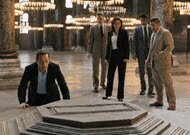Inferno
 for sequences of action and violence, disturbing images, some language, thematic elements and brief sensuality.
for sequences of action and violence, disturbing images, some language, thematic elements and brief sensuality.
Reviewed by: Samuel A. Torcasio
CONTRIBUTOR
| Moral Rating: | Extremely Offensive |
| Moviemaking Quality: |
|
| Primary Audience: | Adults |
| Genre: | Mystery Suspense Thriller Adaptation Sequel |
| Length: | 2 hr. 1 min. |
| Year of Release: | 2016 |
| USA Release: |
October 28, 2016 (wide—3,576 theaters) DVD: January 24, 2017 |




plagues in the Bible
Is there an actual place called “Hell”? Answer
Why was Hell made? Answer
Is there anyone in Hell today? Answer
Will there literally be a burning fire in Hell? Answer
What should you be willing to do to stay out of Hell? Answer
How can a God of love send anybody to Hell? Answer
What if I don’t believe in Hell? Answer
THE GOOD NEWS—How to be saved from Hell. Answer

Discover God’s promise for all people—told beautifully and clearly from the beginning. Discover The HOPE! Watch it on Christian Answers—full-length motion picture.







| Featuring |
|---|
|
Tom Hanks … Robert Langdon Felicity Jones … Dr. Sienna Brooks Sidse Babett Knudsen … Dr. Elizabeth Sinskey Ben Foster … Bertrand Zobrist Irrfan Khan … Harry Sims 'The Provost' Omar Sy … Christoph Bruder See all » |
| Director |
|
Ron Howard |
| Producer |
|
Columbia Pictures Imagine Entertainment LStar Capital Brian Grazer Ron Howard |
| Distributor |
“Inferno is upon us”
Prequels: “The Da Vinci Code” (2006), “Angels and Demons” (2009)
The third installment in this series of films based on the Dan Brown novels once again features Tom Hanks as Professor Robert Langdon and is directed by Ron Howard. In comparison with the previous two films that focused more on solving codes related to religion versus science, “Inferno” focuses more on moral dilemmas, global diseases, memory loss and character development. The World Health Organization (WHO), an agency of the United Nations, plays a part in the story.
Like the previous two films it is action packed and fast paced, filled with intriguing elements of mystery, plot twists and turns, and a whole lot of ideas throughout. For what it’s worth, it’s entertaining, but I think the second film is the most intriguing to watch of the three.
Tom Hanks as Dr. Robert Langdon and Felicity Jones as Dr. Sienna Brooks have good performances in these lead roles. Irrfan Khan plays a strong supporting role in the character of Harry Sims, and he brings elements of humor. Hans Zimmer’s score brilliantly impresses once more.
However, the movie is hard to follow. There are so many plot points and twists, that it is easy to get lost. Some things are never resolved. Some characters are mentioned, but we really don’t know what purpose they serve. I have not read the book, and that might explain some of this.
What keps me interested were some good plot twists and interesting dialog, and frankly good acting. But there are many questions left at the end. The films builds a momentum that it never really pays off, and the end is rather anti-climactic.
The premise of the films is that “Inferno”, which is an Italian word for Hell from the Latin “Infernus,” is a code for a plan to wipe out the vast majority of the world’s population. The idea that the antagonists of the film have is that it is necessary to kill most of mankind so that humanity, as a species, can survive and flourish. Reference is made to “Dante’s Inferno,” the first part of an epic poem written in the 14th century called the “Divine Comedy,” and a famous painting by Sandro Botticelli based on that work. A major element of the plot is that a code has been imbedded into that painting for how to implement the “Inferno” plan.
Professor Langdon states, in a rather matter of fact manner, that “our modern conception of Hell” comes from Dante. He asserts that Dante defined and created the concept of Hell seven hundred years ago. This statement is so outlandish, that it truly is laughable on any historic or scholarly level.
Hell was not created or defined seven hundred years ago. The Old Testament gives us elements of the doctrine, but it is fully defined in the New Testament written two thousand years ago. The New Testament writings date back to the first century, and even the most critical of scholars will not place it later than the second.
This two thousand year old document is very clear about the doctrine of Hell. The Lord Jesus Himself spoke about Hell often (Matthew 5:22, 29-30; 10:28; 18:9; 23:15, 23:33; Mark 9:43, 45, 9:47-48; Luke 12:5; 16:19-31). Jesus said of those thrown into Hell that “their worm does not die and their fire is not quenched” (Mark 9:48).
The apostle Paul writes “when the Lord Jesus is revealed from heaven with his mighty angels in flaming fire, inflicting vengeance on those who do not know God and on those who do not obey the gospel of our Lord Jesus. They will suffer the punishment of eternal destruction, away from the presence of the Lord and the glory of His might” (2 Thessalonians 1:7-9).
And perhaps the book of Revelation gives us the clearest picture of Hell, stating, of those in Hell, that “the smoke of their torment goes up forever and ever, and they have no rest, day or night” (Revelation 14:11) and that…
“the cowardly, the faithless, the detestable, as for murderers, the sexually immoral, sorcerers, idolaters, and all liars, their portion will be in the lake that burns with fire and sulfur, which is the second death” —Revelation 21:8
The New Testament abounds with the term Hell, discussions about Hell, and descriptions and images of the concept of Hell. We have not even mentioned all the post New Testament writings that refer to Hell. Dante’s conception of Hell in the 14th century came long after the doctrine was defined. To suggest that he had any role in defining it, let alone in creating it, is an assertion no real scholar can take seriously.
This seems to be what the Dan Brown movies do. Throw out an outrageous assertion meant to undermine an important Christian teaching in the midst of an averagely entertaining movie (or in a well-written novel). But, like his assertions in “The Da Vinci Code,” this one does not hold up on any meaningful historical level.
Now, some will say that it’s just meant to be entertainment, but that I believe is a naïve view. Most films and novels, except for perhaps some pure comedies, have some ideological message they are portraying. At any rate, films like this do lead to water cooler and coffee table discussions about these matters, so knowing the facts is crucial. Hell was defined long before Dante, and it is a concept with very serious implications for every person.
Q & A
- What is the Final Judgment? and What do I need to know about it?
- What is eternal life? and what does the Bible say about it?
- What is eternal death?
- HELL: Fact or Fiction—Is it an actual place?
- Why was Hell made?
- Is there anyone in Hell today?
- Will there literally be a burning fire in Hell?
- What should you be willing to do to stay out of Hell?
- How can a God of love send anybody to Hell?
- What is the love of God?—including answer to the question: Is it really true that God hates the sin, but loves the sinner?
- About GOD’S LOVE AND AN ANSWER TO THE QUESTIONS: What is the true nature of God’s love? Is it biblically accurate to say, “God hates the sin, but loves the sinner”?
- What if I don’t believe in Hell?
- THE GOOD NEWS—How to be saved from Hell
Theological Considerations
At one point in the film, Robert Langdon confronts the villain about his plan to wipe out most of the human race. His justification is that it is for the greater good. If humanity overpopulates, we will not have a race at all, so it is necessary to stop the overpopulation.
This person also mentions, at one point, that they see themselves as a savior of humanity. Langdon rightly counters that “killing billions to save lives is the logic of tyrants.” The Scriptures are clear that all men and woman are made in the image of God, and for a man to murder his fellow man is absolutely wrong at its core (Genesis 9:5-6). One of the antagonists states that sometimes “the acts of God hit the right people.” This shows their arrogance in both playing God, and in acting as judge over their fellow image bearers.
One of the mottoes of these supposed saviors is that “maybe pain will save us.” Their attempt is averted by the film’s end, and Langdon makes the comment that they thought they “were saving the world,” to which another character replies, “They all did.” It is not clear what this implies, but I think it is very likely that this is meant to go beyond the characters of the film and implicate “saviors” throughout history. Given the anti-Christian rhetoric in Brown’s novels and films, this may have been intended as a reference to the work of Christ.
But, what Jesus Christ did was so vastly different from what the “saviors” of this film intended to do, it is not worthy of comparison. He, a completely innocent person, gave His own life to take the punishment for the sins of the world, so that anyone who has been united to Him by faith will be given eternal life. And Jesus certainly did not fail.
The new world will be full of the billions or more that He has redeemed by His blood (Revelation 5:9-10). And many now can proclaim with confidence the difference the Lord Jesus has made in their lives by giving them assurance of forgiveness, true peace, freedom from addictions, a new heart and a new attitude, and a sure hope for the future.
The church is living evidence of the victory of our Lord. Satan tries to undermine the work and love of our Lord, and film is one of his major avenues of deception.
Ironically, the doctrine of Hell this film seeks to discredit is the very teaching that declares justice will be brought to people like the antagonists of this film. How many atrocities have been committed by men against other men? We can think of Hitler, Stalin, and even various parts of the world today.
Do not our hearts cry for justice? Is there One who will judge the earth rightly? The book of Revelation has a consistent scene throughout of martyrs pleading with God for justice against those who murdered them. The lake of fire presented at the end of the book is the culmination of God’s justice.
You see Hell is not some arbitrary place where innocent people are tortured. It is the wrath of God against sinners (Romans 1:18-32). The essence of God’s law is summed up as loving God and loving man (Matthew 22:37-40), that is loving our Creator and those made in His image. Rebellion against God goes hand in hand with acts of injustice from one person to another. When one fails to honor God, he fails to honor those made in His image.
In many of the Psalms, the justice of God is a reason for rejoicing (Psalm 7; 10; 103:6; 109). What if God would just let all sins go? What if no wrongs were ever righted? Something would be wrong with that and our hearts know it. God will judge men like Hitler and other murderers of men. But, His judgment is even more thorough. He will judge the man who was unfaithful to his wife, and the person who slandered and used the person he once called his friend. God will judge. Men will not get away with their acts against each other.
Q & A
- What is the Final Judgment? and What do I need to know about it?
- What is eternal death?
- Are you good enough to get to Heaven?
- How good is good enough to receive entrance to Heaven?
- UNIVERSALISM—Is everyone going to Heaven? Will all people eventually be saved?
- Is God biased? Is it fair to save only some?
The truth is though that no one is innocent. The martyrs who call for justice in the book of Revelation were themselves sinners saved by Christ’s blood.
The verses on Hell we looked at are not merely from a two thousand year old document, they are from the Word of God. And God’s Word details Hell as place of eternal conscious torment. The sinner will either pay for their sin forever there, or the sinner will have his sins paid for by another. God loves the men and women who are made in His image, but He must punish sin.
This is the great dilemma. How did God solve it? The apostle Paul answers, “For all have sinned and fall short of the glory of God, and are justified by His grace as a gift, through the redemption that is in Christ Jesus, whom God put forward as a propitiation by His blood, to be received by faith. This was to show God’s righteousness, because in His divine forbearance He had passed over former sins. It was to show His righteousness at the present time, so that He might be just and the justifier of the one who has faith in Jesus” (Romans 3:23-26).
Q & A
The doctrine of Hell is real, and was foretold in the Bible long ago. It is dangerous to cast doubt on it, as this movie “Inferno” does.
Hell has implications for every person alive, for everyone is a sinner deserving of God’s wrath. Jesus said “unless you repent, you will all likewise perish” (Luke 13:3).
I urge the reader of this article to consider the state of their soul, and their sins against God. As sobering and real as Hell is, just as real is that God has made a way out through the Lord Jesus Christ. His suffering on the cross was not in vain. It is completely sufficient to save anyone who trusts in Him (1 John 2:1-2).
I urge you to do so. For the believer this reality should motivate you to share the Gospel with others, for it is their only hope (John 14:6; Acts 4:12). It should also impress upon you to sincerely pray for others, including men like Tom Hanks, Ron Howard, Dan Brown, and others involved in this film.
Offensive Content
Bad language is listed below. In one conversation sexual immorality is implied. There is a scene of sexual immorality. There are many gun shots, lots of stabbing, graphic images of people burning, bloody water, marred and frightening faces, and backward heads. There is a scene of suicide, and another of one being plummeted to their death.
Summary
This film is definitely not for children, due to its offensive content. The movie itself is entertaining, but nothing one should rush to see on the big screen.
It is clear, as we discussed above, that the film tries to assert Hell was a doctrine created by men, but, other than that, it is not clear at all exactly what the core message of this film is.
The complexity of plot points, characters, and concepts make this a confusing watch. The only reason that I could see for recommending this film is for apologetic purposes. Many people are into the Dan Brown novels and ideas of a similar nature, so, for the Christian who wants to get a better idea of where they are coming from, I suppose seeing this film may provide some perspective. But the clearest assertion of this film is easily refuted by the Scriptures we have discussed.
The ideas presented in this film are the work of the Serpent who is always trying to undermine the truth. From the beginning Satan has lied, undermined God’s Word, and tried to confuse people about the truth (Gen 3:1-7). Satan lies, but God always tells the truth.
The truth is in the time tested Scriptures, not in the latest Hollywood movie.
Violence: Heavy / Profanity: Heavy—“Oh my God” (3), “G*d damn” (1), “God” (2), “My G*d” (1), “d*mn” (3), h*ll (2), f-words (1), s-words (2) / Sex/Nudity: Moderate to Heavy—nude statues (full frontal), nude paintings, shirtless male, cleavage, woman on top of a man (kissing and breathing heavily), kiss
See list of Relevant Issues—questions-and-answers.


PLEASE share your observations and insights to be posted here.


My Ratings: Moral rating: none / Moviemaking quality: 2